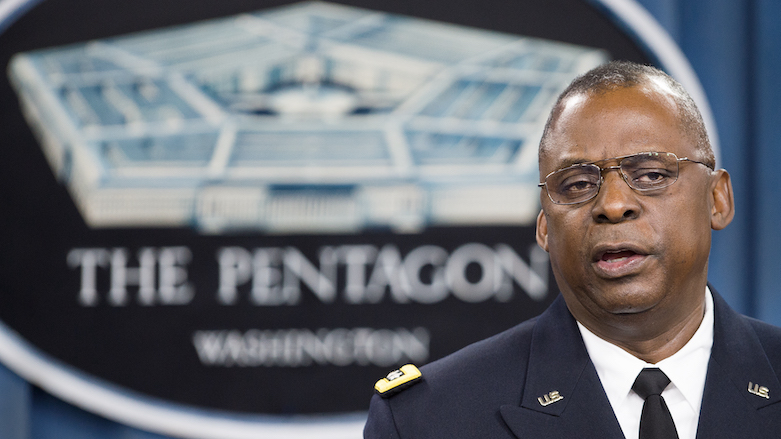Biden’s SecDef nominee, Gen. Austin, has long experience with Iraqis, Kurds

WASHINGTON DC (Kurdistan 24) – President-elect Joe Biden is expected to name Gen. Lloyd Austin (US Army, Ret.) as Secretary of Defense, US media reported on Monday.
If confirmed, Austin, 67, would be America’s first African-American Secretary of Defense.
Austin has long been involved in US military efforts in Iraq. Most notably, in 2013, he was appointed as head of CENTCOM and was serving in that position the next year, as the so-called Islamic State burst out of Syria into Iraq, conquering one-third of the country, threatening Baghdad, as well as Erbil, and precipitating the return of US forces to Iraq. He remained in that position, until March 2016 and his retirement from the Army.
In December 2015, Austin led a senior military and diplomatic delegation to Erbil, where he met with the President of the Kurdistan Regional Government (KRG), Masoud Barzani.
READ MORE: President Barzani praises role of US-led coalition airstrikes in defeating Jihadists
Some two months later, Austin returned to Erbil for another meeting with Barzani to discuss US support for the Peshmerga to enable their fight against the Islamic State.
READ MORE: Barzani, Gen. Austin discuss Peshmerga needs
Interviewed shortly thereafter, as he retired from the Army, Austin was described by an Army reporter as “the architect of the counter-Islamic State group campaign in Iraq and Syria.”
In that interview, Austin explained that a key lesson from his experience was “the necessity of coalitions” that include “willing and able partners, built and maintained through security force assistance activities,” which “is an essential enabling capability.”
In addition to the Peshmerga, that includes the Kurdish-led Syrian Democratic Forces (SDF), who have been the Coalition’s main partner against the Islamic State in Syria.
Under Austin’s leadership, the US military began directly providing arms and ammunition to the SDF, The New York Times explained.
Biden’s son, Beau, who died in 2015 of brain cancer at the tragically young age of 46, was a lawyer and an officer in the Delaware Army National Guard. He served as a military lawyer in Iraq under Austin’s command.
“In late August of 2010, I traveled to Iraq for the fifth time as vice president,” Biden wrote Tuesday in The Atlantic, and “participated in the change-of-command ceremony for United States Forces–Iraq,” as Austin took charge.
“We were committed to ensuring the orderly withdrawal of our forces and equipment from Iraq,” Biden continued. “Standing in the garish al-Faw palace, once home to Saddam Hussein, but by then part of Camp Victory, I watched as General Lloyd Austin assumed leadership of a national-security priority on behalf of the president of the United States.”
“I’ve spent countless hours with him, in the field and in the White House Situation Room,” Biden added, explaining his choice. “I’ve sought his advice, seen his command, and admired his calm and his character.”
Nicholas Heras, of The Institute for the Study of War, seconded that view, telling Kurdistan 24, “General Austin is clearly a leader whom President-elect Biden knows he can trust at a time of significant churn within the Pentagon and in US defense policy.”
“Austin’s extensive experience in the Middle East during times of tumult is a major bonus for a new administration looking to ramp up efforts to leave a sustainable presence there, while pivoting to other national security challenges such as China and Russia,” Heras continued, as he praised Austin’s “intimate knowledge” of the Middle East, “including the counterterrorism battle against ISIS in Iraq.”
Austin Rebuts Rumsfeld: Technology Doesn’t Win Wars
In key respects, Austin’s 2016 Army interview reflected a refutation of the strategy of US Secretary of Defense, Donald Rumsfeld, as Washington went to war in 2003 to oust Saddam and his regime.
“Shock and awe” was Rumsfeld’s mantra. Americans, including the military, like technology, and they are very good at it. But they have little patience for knowledge of foreign cultures: indeed, such knowledge is little valued.
Yet that, as Austin suggested in his 2016 interview, constitutes a significant shortcoming. “At times, we’ve placed too much hope and credit on the winning ingredient being technological solutions,” he said. It is “a necessary ingredient,” but “it is insufficient alone.”
“We need to have longer duration assignments of our talent base with foreign partners,” Austin continued. “We need to be more multilingual in our operations.” Language is often the key that unlocks culture, and we need “as much expertise in our partners’ defense and security enterprises as we do in our own.”
Indeed, this reporter served as a cultural adviser to the US military in both Iraq and Afghanistan. Commonly, US forces deployed in theater were well aware of the problem that Austin noted. Deployments could be as short as six months. By the time someone had some understanding of the situation, he could well be on the way out.
In his 2016 interview, Austin also stressed the importance of preserving “our current forward presence to the greatest extent possible, rather than cede ground and regional influence.”
“Presence buys you influence, which is built on trust,” and “you can’t surge trust,” he said.
In 2003, as Operation Iraqi Freedom began, Austin was Assistant Division Commander for Maneuver of the 3rd Infantry Division and helped lead its entry into Iraq. In 2008, he became the second-highest US Army officer in Iraq, before ascending to the top position two years later in the ceremony witnessed by then Vice-President Biden.
Austin must be confirmed by the Senate before he can become Secretary of Defense. US law requires that a military officer be retired for seven years, before assuming that position, although a waiver is possible. Indeed, former Secretary of Defense Jim Mattis was granted such a waiver.
Some Democratic senators have objected to Austin’s nomination on those grounds, but he is also generally well-regarded and enjoys substantial support in Congress.
Editing by Karzan Sulaivany
